When you’re 70 or older, leaking a little when you laugh, cough, or rush to the bathroom isn’t just annoying-it can make you avoid social events, skip outings, or even stop going out altogether. For many older adults, this isn’t just about aging. It’s often overactive bladder, a condition where the bladder muscles contract too often, even when the bladder isn’t full. One of the most common medications prescribed for this is oxybutynin. But is it the right choice? And what are the real risks and benefits for seniors?
What Is Oxybutynin and How Does It Work?
Oxybutynin is an anticholinergic drug. That means it blocks a chemical in your body called acetylcholine, which tells your bladder to squeeze. When the bladder overreacts-contracting too early or too often-oxybutynin calms it down. It doesn’t cure the problem, but it reduces the sudden urges to pee and helps prevent leaks.
It comes in several forms: tablets you swallow, a skin patch you stick on, and a gel you rub on your skin. Each works differently. The patch and gel deliver the medicine slowly through your skin, which often causes fewer side effects than swallowing pills. For older adults, this can make a big difference in how well they tolerate the drug.
Why Is Oxybutynin Commonly Prescribed to Older Adults?
Overactive bladder affects up to 30% of adults over 65. It’s not a normal part of aging, but it becomes more common as muscles weaken, nerves misfire, and other health conditions pile up. Conditions like diabetes, Parkinson’s, or previous pelvic surgeries can make it worse.
Doctors reach for oxybutynin because it’s been around for decades, it’s cheap, and it works-for many people. Studies show it reduces urinary urgency episodes by about 50% and cuts incontinence episodes by nearly 60% in older adults over 12 weeks. That’s meaningful improvement for someone who’s been avoiding trips to the park or skipping family dinners because they’re scared of accidents.
The Hidden Risks: Why Oxybutynin Can Be Dangerous for Seniors
But here’s the problem: oxybutynin doesn’t just affect the bladder. It blocks acetylcholine everywhere in the body-including the brain. That’s why older adults are at higher risk for side effects like confusion, memory lapses, dizziness, dry mouth, constipation, and blurred vision.
A 2023 study in the Journal of the American Geriatrics Society found that seniors taking oxybutynin had a 40% higher risk of developing new cognitive problems within six months compared to those not taking it. That’s not just a side effect-it’s a serious safety concern. For someone already dealing with mild memory issues, oxybutynin can push them over the edge.
It also increases the risk of falls. Dizziness and blurred vision from the drug can make walking unsafe. One in three older adults falls each year. Add oxybutynin to the mix, and that risk climbs. The CDC lists anticholinergics like oxybutynin as medications that should be used with extreme caution-or avoided-in seniors.
Who Should Avoid Oxybutynin?
Not everyone should take it. You should avoid oxybutynin if you have:
- Glaucoma (especially closed-angle)
- Severe constipation or bowel obstruction
- Myasthenia gravis
- Significant kidney or liver disease
- Already taking other anticholinergic drugs (like some antidepressants or sleep aids)
Even if you don’t have these conditions, if you’re over 75, have memory concerns, or take more than three other medications, oxybutynin should be a last resort-not a first choice.
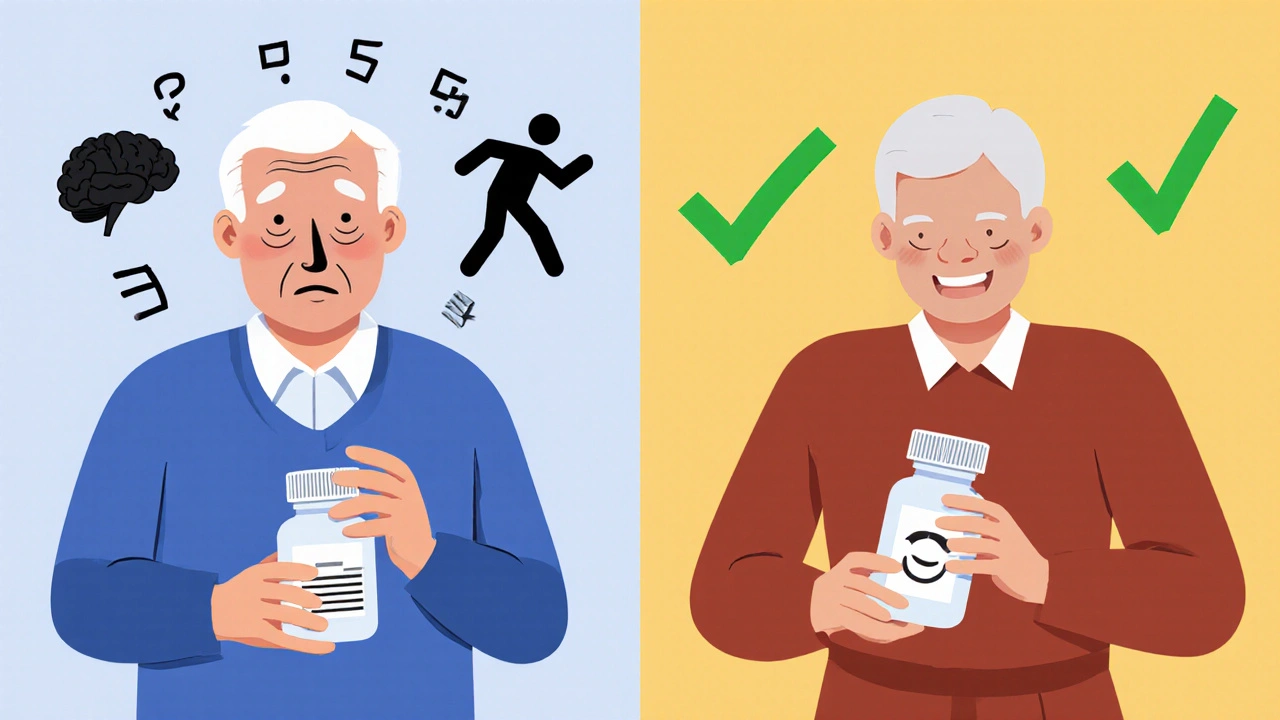
Alternatives to Oxybutynin: What Else Works?
There are better, safer options for many older adults.
Behavioral therapy is the first-line recommendation from the American Urological Association. That includes bladder training-waiting a few extra minutes before rushing to the bathroom-and scheduled bathroom trips every two to three hours. Pelvic floor exercises (Kegels) can also strengthen the muscles that control urine flow. A 2022 trial showed that just 12 weeks of bladder training reduced incontinence episodes by 70% in seniors, with no side effects.
Tolterodine and fesoterodine are newer anticholinergics that are slightly less likely to cross into the brain, making them a bit safer than oxybutynin. But they still carry risks.
Mirabegron is a completely different type of drug. Instead of blocking acetylcholine, it relaxes the bladder muscle by activating a different receptor. It doesn’t cause dry mouth or confusion. Studies show it’s as effective as oxybutynin for reducing urgency and leaks, but with far fewer cognitive side effects. It’s more expensive, but for many seniors, the trade-off is worth it.
Botox injections into the bladder are another option for those who don’t respond to pills. It’s not a cure, but it can last six to nine months and avoids daily pills entirely.
What to Do If You’re Already Taking Oxybutynin
If you or a loved one is on oxybutynin right now, don’t stop cold turkey. Suddenly stopping can cause a rebound in bladder symptoms. Talk to your doctor about a plan to taper off slowly while trying a safer alternative.
Ask these questions:
- Could I try bladder training or pelvic floor therapy first?
- Is mirabegron a better option for me?
- Am I taking any other drugs that might interact with oxybutynin?
- Have I had a cognitive screening in the last year?
Keep a bladder diary for a week. Write down when you go to the bathroom, how much you urinate, and if you had any leaks. This gives your doctor real data-not just guesses-to decide what to do next.
Non-Medication Strategies That Actually Help
Medication isn’t the only tool. Simple lifestyle changes can make a huge difference:
- Limit caffeine and alcohol-they irritate the bladder.
- Don’t drink large amounts of fluids right before bed.
- Use absorbent pads or protective underwear if needed. They’re not a sign of defeat-they’re a tool for freedom.
- Install grab bars and night lights to reduce fall risk.
- Consider a portable urinal or bedside commode if nighttime trips are dangerous.
Many seniors feel embarrassed to talk about bladder issues. But the truth is, doctors see this every day. The more you talk about it, the sooner you can find a solution that keeps you safe, dry, and active.
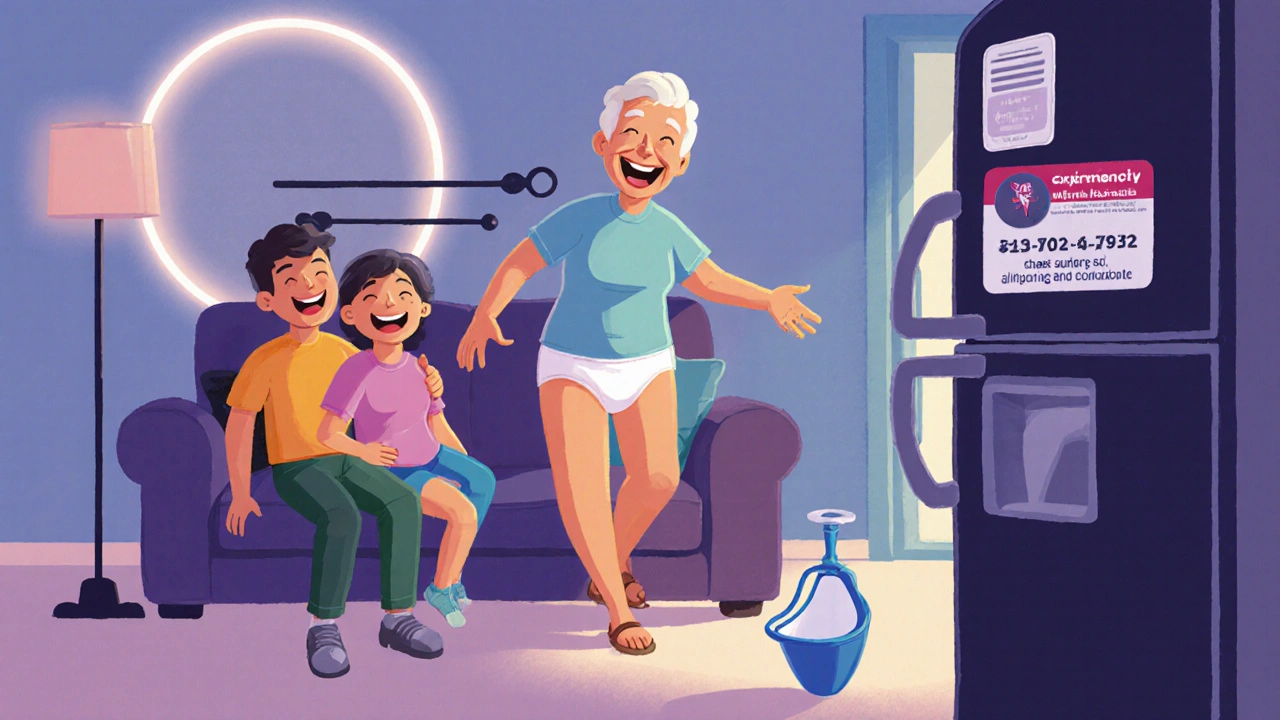
When to See a Specialist
If you’ve tried lifestyle changes and one or two medications without success, or if you’re experiencing pain, blood in the urine, or sudden inability to urinate, it’s time to see a urologist. These could be signs of something more serious-like a bladder infection, prostate enlargement, or even a tumor.
A urologist can do tests like a bladder scan, urine flow study, or cystoscopy to see what’s really going on. Sometimes, what looks like overactive bladder is actually something else entirely.
The Bottom Line
Oxybutynin can help with overactive bladder-but for many older adults, the risks outweigh the benefits. Cognitive decline, falls, and dry mouth aren’t just side effects. They’re life-altering problems. There are safer, equally effective alternatives. Bladder training, mirabegron, and simple lifestyle changes often work better and without the danger.
Don’t accept leaking as inevitable. Don’t stay on oxybutynin just because it’s what your doctor prescribed years ago. Ask for a review. Ask for alternatives. Your brain, your balance, and your independence are worth fighting for.
Is oxybutynin safe for seniors with memory problems?
No, oxybutynin is not safe for seniors with memory problems. It blocks acetylcholine, a brain chemical important for memory and focus. Studies show it increases the risk of confusion, dementia-like symptoms, and cognitive decline in older adults-even those with no prior memory issues. If memory problems are present, oxybutynin should be avoided.
How long does it take for oxybutynin to work?
Most people notice less urgency and fewer leaks within one to two weeks. Full effects usually take about four to six weeks. If you haven’t seen improvement after eight weeks, the medication likely isn’t working for you, and you should talk to your doctor about alternatives.
Can I stop taking oxybutynin suddenly?
No. Stopping oxybutynin suddenly can cause a rebound in bladder symptoms-worse than before. Always work with your doctor to taper off slowly. They may switch you to a safer drug like mirabegron while reducing the oxybutynin dose over several weeks.
What are the signs that oxybutynin is causing harm?
Watch for confusion, forgetfulness, dizziness, dry mouth, constipation, blurred vision, or trouble urinating. If you notice any of these, especially if they’re new, contact your doctor immediately. These aren’t normal aging signs-they could be drug side effects.
Are there natural remedies for overactive bladder?
There’s no proven natural cure, but lifestyle changes can help significantly. Cutting caffeine, avoiding alcohol, doing pelvic floor exercises, and scheduling bathroom visits are all evidence-based. Some people find pumpkin seed extract or magnesium supplements helpful, but research is limited. Always talk to your doctor before trying supplements-they can interact with other medications.
Next Steps for Older Adults and Caregivers
If you’re managing bladder issues in an older adult, start here:
- Get a bladder diary going for seven days.
- Review all medications with a pharmacist or doctor-look for other anticholinergics.
- Ask about mirabegron or pelvic floor therapy before accepting oxybutynin.
- Install safety features at home: night lights, grab bars, non-slip mats.
- Don’t wait until a fall happens to act. Prevention starts with a conversation.
Overactive bladder doesn’t have to mean isolation. With the right approach, older adults can stay dry, safe, and active-without relying on drugs that put their brain and balance at risk.
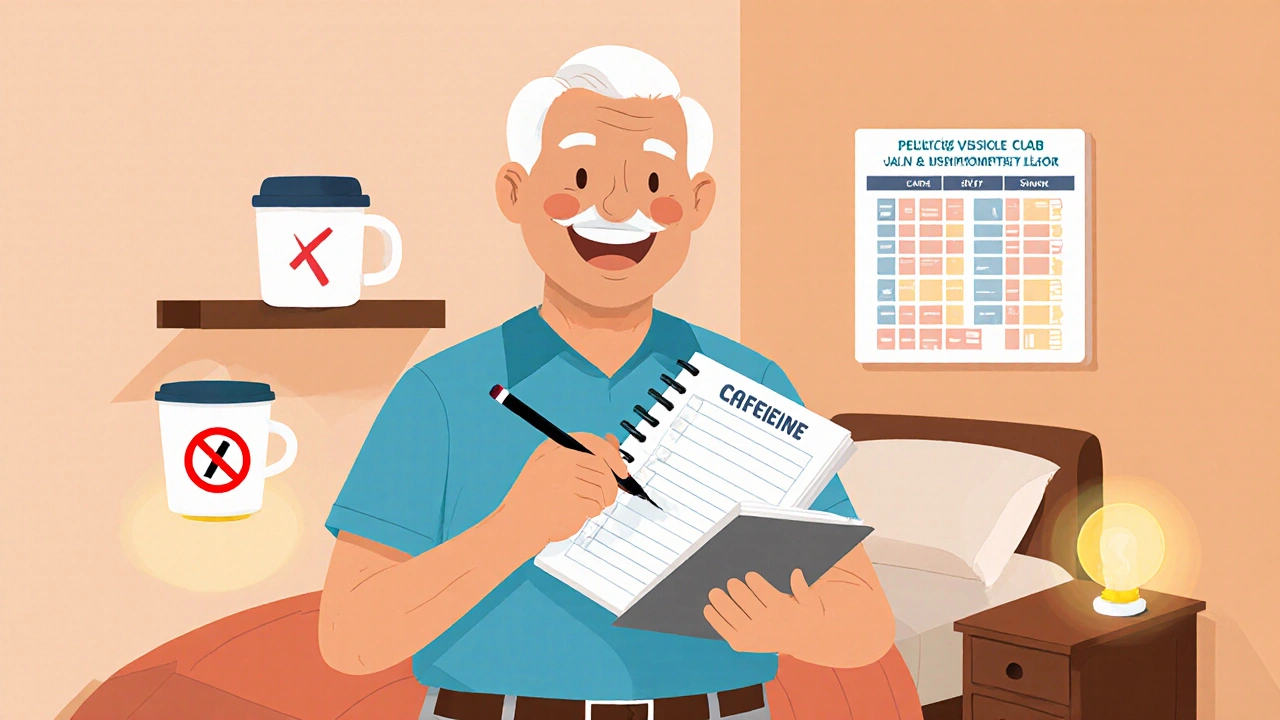
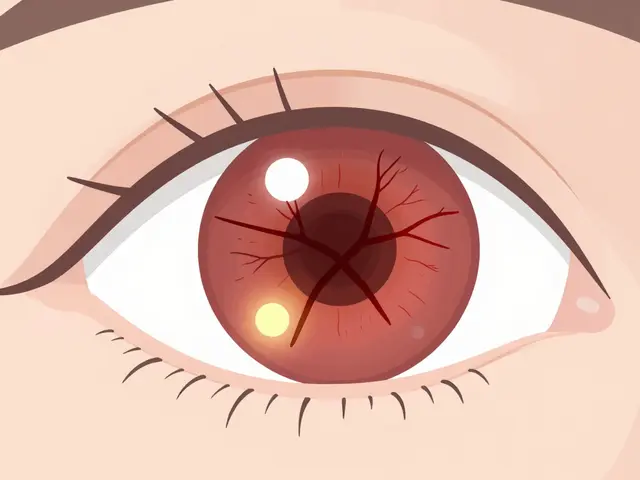


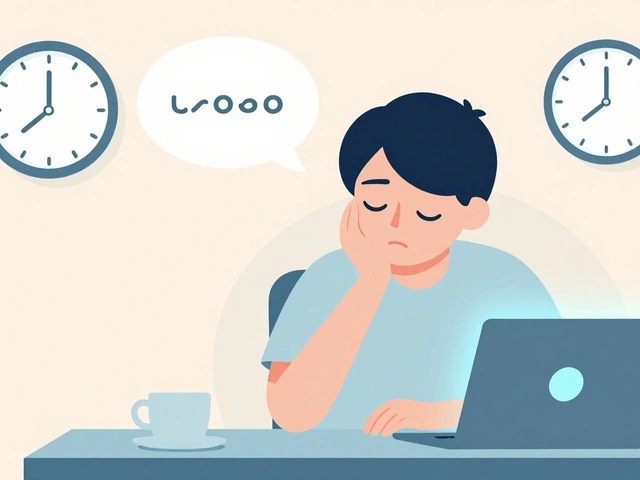


Man, I wish my dad’s doctor had read this before prescribing him oxybutynin. He went from ‘I’ll just use the bathroom every hour’ to ‘Who is this woman and why do I not remember her name?’ in two weeks. Now he’s on mirabegron and actually remembers my birthday again. 🙌
STOP GIVING OLD PEOPLE DRUGS AND START TEACHING THEM TO HOLD IT. My grandma used to wait till she got to the bathroom and lived to 98. You’re all just weak.
Hey, I’m a nurse and I see this ALL THE TIME. Oxybutynin is the lazy fix. But bladder training? Kegels? Scheduled voiding? Those work better than pills-and no brain fog. I had a 78-year-old client who went from 12 leaks a day to 2 after 6 weeks of pelvic floor PT. No meds. Just patience and practice. You got this.
One must, with the utmost gravitas and solemnity, acknowledge that the pharmaceutical-industrial complex has, in its infinite wisdom, chosen to monetize the natural degradation of human physiology through the deployment of anticholinergic agents-while simultaneously ignoring the profound, evidence-based efficacy of behavioral interventions that require neither prescription nor patent. The tragedy is not the bladder; it is the mind that has forgotten how to listen to it.
Oh please, mirabegron is just a fancy placebo with a higher price tag. You think your grandma’s bladder is gonna fix itself? Wake up. The body’s a machine-sometimes you need the right chemical wrench. And if you’re too scared of side effects, maybe you shouldn’t be drinking coffee at 70. 🤷♂️
So… you’re saying we should just… stop giving people meds? And do… exercises? Like, in 2024? That’s so… old school. My cousin’s 75 and she takes 7 pills. She’s fine. This post feels like a yoga retreat pamphlet.
Let me offer a structured, evidence-informed perspective grounded in clinical best practices and geriatric pharmacology: while behavioral interventions such as bladder training and pelvic floor rehabilitation are indeed first-line recommendations per AUA guidelines, their success is contingent upon patient adherence, cognitive function, mobility, and caregiver support-all of which are highly variable in the elderly population. Therefore, while oxybutynin carries significant anticholinergic burden, its utility in select patients with high symptom burden and low risk of cognitive decline cannot be categorically dismissed without individualized risk-benefit analysis. The true paradigm shift lies not in eliminating medications, but in integrating them into a multidisciplinary care model that prioritizes functional outcomes over pharmacological reductionism.
My mom died because of this drug. Don’t let it happen to yours.